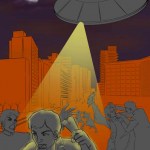Signed-off with an apt message.
DesiPundit
Over the weekend dug and tilled a patch of land in the garden to plant some herbs. It took an hour and the effort was rewarded with a rich harvest of pebbles, worms and roots of various sizes that ran underground like highways carrying nutrients to far away places (one can imagine trees as cities here, the analogy seems to fit quite well). Just beneath one's feet lurks a world that we are oblivious to most of the time. Sometimes, to feel human, we must plant our feet an inch into the ground and let our head and shoulders soak in the air and sun.
I planted sage, peppermint (top) and basil,…
A report on BBC on a psychology study done in Australia.
The University of New South Wales researcher says a grumpy person can cope with more demanding situations than a happy one because of the way the brain "promotes information processing strategies".
Information processing strategies! That rings the bullshit bell in my grumpy head, loudly and clearly. I don't intend to discredit the study. It is unfortunate that everything in psychology seems questionable. Many of these studies appear misleading even when they may lead us down a useful path. That's this subject's bane.
A little poem I wrote for the little ones (5 year old niece Nethra and 2 1/2 year old daughter Nidhi).
Small Finger of a Lady Singer
I am the small finger
Of a lovely lady singer.
When her voice goes south
She puts me in her mouth
Or strikes up a pose
And puts me in her nose.
The name Facebook comes from college yearbooks where photos of classmates are stuck and things are scribbled on. The scribblings are some(many?)times deeply regretted later in life. As most of you who read this may already know, Zuckerberg who started Facebook is young and reckless (not unusual in itself, but his success with Facebook is). His stand on privacy is that of someone who is out of his depth and not that of someone who is a revolutionary. You can read an interesting and critical analysis here. I quote:
Zuckerberg and gang may think that they know what's best for society, for…
Trying to place science and literature in their proper places in my head. The story so far...
If Science is an undertaking to find Absolute Truths, then what is Literature with a dominant scientific theme (like Ian McEwan's Solar or E. O. Wilson's Anthill)? Literature can't take the place of science in leading us to absolute truths. So what is it for? To me, it appears to be an undertaking to talk about the path, the exploration itself. Measured discourse (good literature), as it does always, can illuminate the way--ahead of us and behind us. More than the illumination, it is--for those who…
Crab Nebula
Caesium-133 atom has 551,557,906,200 heartbeats per minute
Humans have 70 heartbeats per minute
Sun has 1 heartbeat every 11 years
Crab Nebula pulsar has 1812 heartbeats per minute
Wondering what's the purpose of all this time keeping.
Self portrait
The american poet E. E. Cummings' poems usually have mashed-up capitalization, punctuation and are constructed on the page with words as visual art. Consider the below poems where he presents his (typical early 20th century) views on science and technology as having a rather callous effect on earth. His expression of that sentiment is a delicious mix of metaphors wonderfully painted. Very enjoyable.
O sweet spontaneous
by: E.E. Cummings (1894-1962)
sweet spontaneous
earth how often have
the
doting
fingers of
prurient philosophers pinched
and
poked
thee
, has the…
A fascinating presentation. The logical conclusion of a world singing to the tune of commerce. Life as a game. A gloriusly simplified abstraction over the complexities of real life. What's gonna stop it? You and me? Cue in uproarious laughter.
Well, Mr. Schell does throw in a bit of optimism in the end. If we think all our actions are recorded and left behind as our legacy, maybe we'll change our behavior. Maybe, but probably not. The optimism seems contrived.
In any case, all the world will not become a game. The world is too complex a place for us (acting as corporations and government)…
I had been a apple computer user for the past 5 years and immensely enjoyed the hardware and the software. But, all good things come at a price. Apple's price for a polished user experience has lately turned out to be user freedom. The inability to take out and use the content stored in apple's walled garden is stultifying. I understand that those who are not too keen to learn the innards of computer hardware and software may find apple's products liberating (that is why, Ramya still uses the mac for all her needs and I am fine with it). However, apple has broken faith with those who promoted…
Lack of understanding [is] called stupidity; deficiency in the application of the faculty of reason to what is practical we [recognize] as foolishness; deficiency in power of judgement as silliness; finally, partial or even complete lack of memory as madness... That which is correctly known through the faculty of reason is truth. -From The World as Will and Representation, First Book, Section 6.
As moralizing as it sounds, Schopenhauer is not being so here. This is his way of defining the terms of discussion. As I continue reading, it is remarkable to notice how he uses the Principle of…
A poo bag that can make a difference to a lot of people in need, especially women and children. The PeePoo site.
[via NDTV, thanks Ramya.]
Is there a difference between thinking and thinking hard? I mean, thinking is thinking. How can you say if someone is thinking hard or not?
Well, I am going to first call on Newton to tell you what that difference is. Newton said, `If others would think as hard as I did, then they would get similar results.'
What does Newton mean? Let that question throw sparks in your mind, meanwhile let me call Einstein, or more accurately Abraham Pais who wrote a great deal about Einstein with much insight. In his book Suble is the Lord, Pais often insists that Einstein thought long and hard about certain…
G H Hardy once said numbers would exist even if the universe did not. The zoom below takes us into that alternate mathethematical reality which appears to be more richer and deeper than our physical one.
Mandelbrot Fractal Set Trip To e214 HD from teamfresh on Vimeo.
Via kottke
Chesnut School Lane, Amersham.
A few days back when England was covered in a bit of snow, an image on the television screen caught my eye. An aerial camera was showing a highway from above--for a moment the snow covered trees and houses looked like they were engulfed in thick white clouds. Snow looks like clouds: this is so obvious that I thought nothing of it until later, when I started having a nagging feeling that it wasn't so obvious.
Why should snow and clouds look the same to us? I mean, is there a way to find some way to measure the two on some aspect and say, right, this is why they…
I am reading "Einstein, a life", by Denis Brian. The book is remarkable--a two decade long labor of great love and reading. Quoted in the book is a dinner conversation where Einstein is asked about his religion by someone at the dinner:
"What?" exclaimed Kerr. "It isn't possible! I must ask him right away. Professor! I hear that you are supposed to be deeply religious?"
Calmly and with great dignity, Einstein replied, "Yes, you can call it that. Try and penetrate with our limited means the secrets of nature and you will find that, behind all the discernible concatenations, there remains…
First the name. Avatar--if you play computer games, you may know this very well--is a character you use inside an unreal world. The word Avatar has its origins in Indian mythology. An Avatar (ava-tara in Sanskrit) is god's visit to earth to fix something that is broken. Vishnu, one of the three gods who protects creation, by necessity visits earth often. Vishnu, the puranas declare, is dark-blue in color (the original story teller was inspired by blue oceans, blue sky?). To go with the name Avatar, Cameron has also decided to paint the aliens blue, possibly inspired by Hindu mythology. The…
at TheScian.com. Enjoy. The authors would be glad to see your comments and--am sure--would happily respond.
The stories are a break from the past. They are uncompromising, and hence, I hope, will give the reader the rare satisfaction of a thoughtful discussion, rather than superficial entertainment.
TheScian SF book is in the works. More illustrations have been done. Here's one done recently for the story 'Live and exclusive'.
Congratulations to the winners and thanks to all the participants. The stories will go online at TheScian.com within a few days.
First prize - "Stalker" by Shuchikar (author's penname)
Second prize - "On board the Ark" by Ankit Bhardwaj
Third prize - "Dropping Off" by Ramanand
I am pleased to say that all three stories have a darker theme than most of the earlier years' stories. This is good. We are moving beyond the initial awe-and-wonder phase of SF into more mature and adult themes. More on these later after I get them online. The work on the SF book is proceeding at a steady pace. As of…


